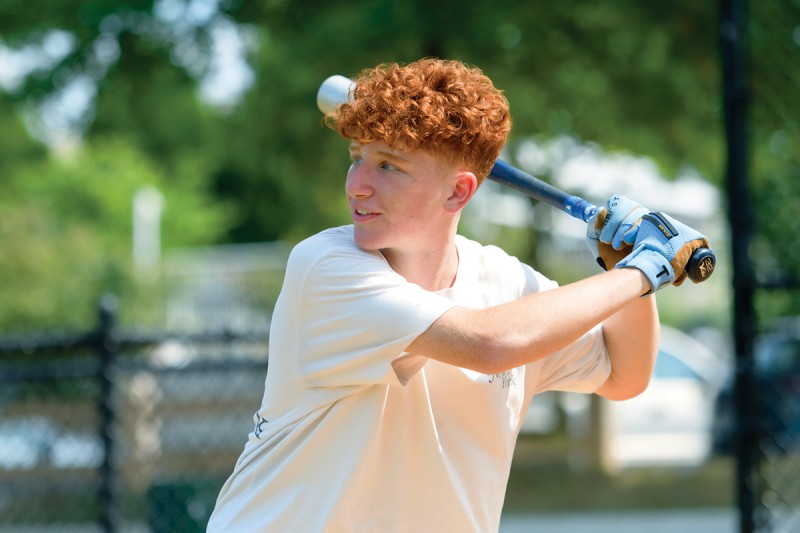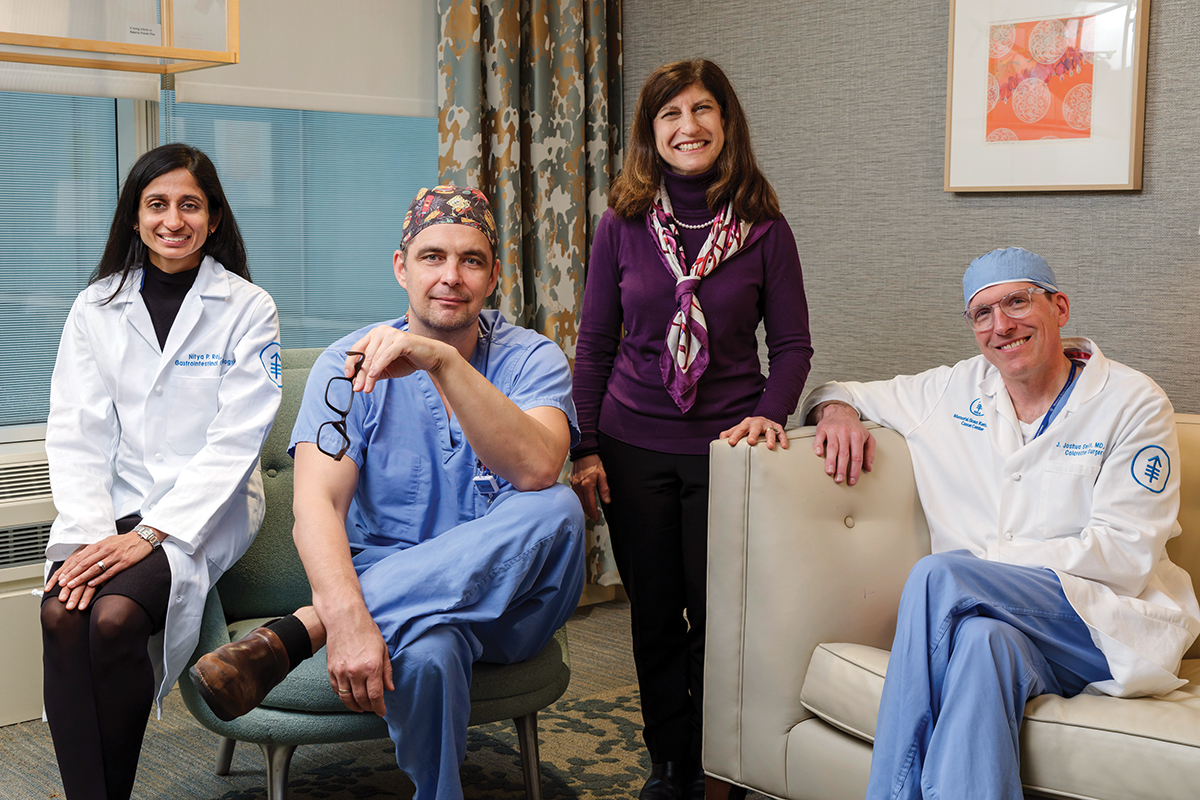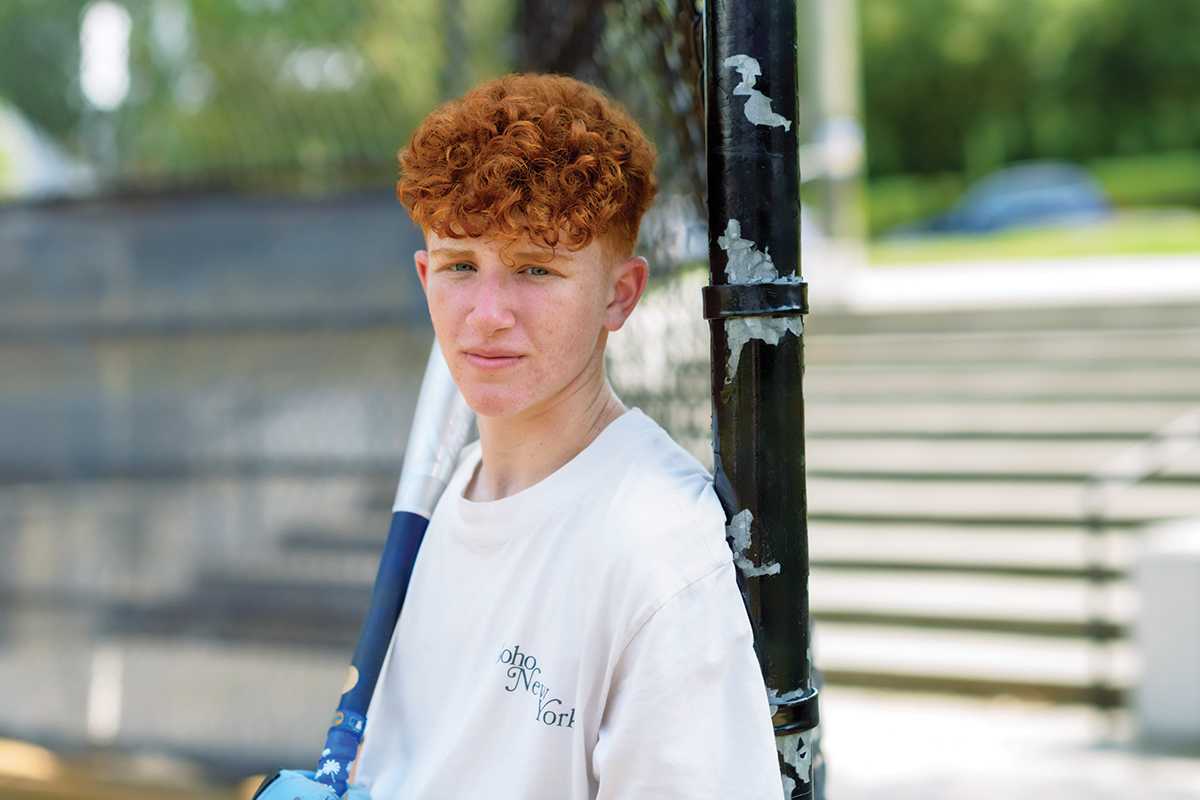
Sammy is back to playing varsity baseball after successfully being treated at MSK Kids for a rare cancer.
Today Sammy C. is a healthy 16-year-old boy — a top varsity athlete who plays three sports. But only 18 months ago, his life was very different. Sammy was dealing with a neuroendocrine tumor, a rare and aggressive cancer, in the lower part of his colon. He and his family sought help from MSK Kids — the pediatric department at Memorial Sloan Kettering Cancer Center (MSK).
Sammy’s remarkable treatment and recovery are a result of the experienced MSK Kids medical team collaborating closely with the doctors who treat adult patients at MSK. In recognition of MSK’s expertise in treating young patients like Sammy, in 2023 the American College of Surgeons designated MSK the first-ever Level I Specialty Children’s Center in Oncology. This national honor means that MSK meets the highest-quality standards for surgical care in young patients.
“Regular children’s hospitals have expertise in many areas, but it’s not as deep as if you concentrate on one area,” says MSK Kids pediatric surgical oncologist Enrico Danzer, MD, one of Sammy’s doctors. “At MSK, our focus is solely on cancer, and that’s where some of the advantages come in. We have surgeons with expertise in particular organs, and we also have surgeons who specialize in pediatric surgery. When our teams work together, patients get the best of both worlds.”
Sammy’s care was overseen by specialists highly skilled in pediatric and colorectal surgery. It also required the knowledge of medical oncologists who are familiar with treating younger patients diagnosed with cancers that usually affect older adults.
“We always felt like the whole MSK team was taking care of Sammy,” says his mother, Alyson.
How MSK Kids Got a Teen Athlete Back in the Game After Rare Neuroendocrine Cancer
Everything about Sammy’s cancer experience was out of the ordinary, beginning with his diagnosis. Since age 4, he had been coping with ulcerative colitis, a chronic inflammation of the large intestine that is rare in children so young. To monitor his condition, he had regular colonoscopies. During one in November 2021, his gastroenterologist saw an unusual area and collected a few samples. The samples turned out to be a high-grade neuroendocrine carcinoma, a rare cancer usually diagnosed in people older than 50.

Sammy’s expert care team included (from left) gastrointestinal oncologist Nitya Raj, MD; pediatric surgeon Enrico Danzer, MD; pediatric hematologist-oncologist Julia Glade Bender, MD; and colorectal surgeon J. Joshua Smith, MD, PhD.
Sammy and his parents were referred to MSK Kids pediatric hematologist-oncologist Julia Glade Bender, MD, co-leader of the Lisa and Scott Stuart Center for Adolescent and Young Adult (AYA) Cancers and a specialist in rare tumors. Dr. Glade Bender treats only a handful of AYA patients with neuroendocrine tumors every year, but that is more than most pediatric oncologists will see in a lifetime.
“During that first meeting, we met the entire pediatric team,” says Larry, Sammy’s dad. “We walked in, and it was just beautiful. Sammy loved the big fish tank in the waiting area and the fact that Dr. Danzer was wearing a SpongeBob surgical cap.”
Sammy’s team determined that the cancer was aggressive but treatable. Scans confirmed it had not spread anywhere else in his body.
Drs. Danzer and Glade Bender immediately consulted with their counterparts who specialize in treating neuroendocrine tumors in adults — including colorectal surgical oncologist J. Joshua Smith, MD, PhD, and medical oncologist Nitya Raj, MD — as well as with MSK Kids pediatric gastroenterologist Stanley Cho, MD.
“They got every expert opinion they could to figure out the best care for Sammy,” Larry says.
This team approach is typical at MSK Kids and a major reason for the special designation from the American College of Surgeons.
Treating Kids With Adult Chemotherapy Drugs
The team decided that Sammy’s first treatment should be chemotherapy to destroy as much of the tumor as possible and reduce the risk that it would spread. Because of the location of the tumor, they also chose not to give radiation therapy, which could have affected his fertility. Sammy was given a combination of drugs that is standard for treating adults with neuroendocrine tumors but is used infrequently in kids since the disease is so uncommon in this age group.
Sammy was able to complete all six treatments, but the side effects were rough. Nausea made it hard for him to eat. Some of the drugs made him sensitive to cold, and others made his hair fall out. He had to attend school online. But throughout his chemotherapy, he continued going to basketball practice, supporting his team from the bench on the days he didn’t feel well enough to play.
After he recovered from chemotherapy, Sammy was scheduled for surgery. The drugs had destroyed 95% of his tumor, but there was a high risk it would come back.
A Close Collaboration Between MSK Kids and Adult Colorectal Surgery
Sammy’s surgeons wanted to make sure that every neuroendocrine tumor cell was removed, while at the same time protecting important nerves in the pelvic area. His history of ulcerative colitis made the surgery even more complicated. Drs. Danzer and Smith collaborated closely every step of the way — from planning the surgery to teaming up in the operating room on the day of the procedure.
“Dr. Danzer and I have different areas of expertise,” Dr. Smith says. “But we work together often enough that the whole thing was seamless.”
They were able to do the surgery through small incisions using minimally invasive techniques, which allowed Sammy to heal more quickly than he would have from a more extensive operation.
From Surgery Back to the Playing Field, Thanks to MSK Kids Expertise
Sammy was hospitalized for almost two weeks after his surgery. He enjoyed the special attention from everyone who came to his room, especially massage therapist Rocco Caputo and dance and movement therapist Jenn Whitley, who helped him fall asleep by playing a rain stick.
Between chemotherapy and recovery from surgery, Sammy lost 30 pounds — mostly muscle. He was anxious to get back to feeling like himself again: Baseball season was starting.
“When I first went back, I was allowed to swing a bat and throw a ball, but I wasn’t allowed to slide into bases yet, which kind of stunk,” Sammy remembers. “My energy wasn’t all there, and I had to give my body time to adjust.”

Sammy is now cancer free — and grateful.
In the fall, about four months after surgery, his doctors gave him the good news: His body had fully healed. It was perfect timing for his first chance to try out for a high school sport. He made the varsity soccer team playing goalie — an impressive accomplishment for a freshman, especially someone who’d been through aggressive cancer treatment.
Sammy spent the winter continuing to build back his strength. In the spring, he made the varsity baseball team, where he played center field — a demanding position involving long throws and lots of running. His hair grew back, and — to his mom’s delight — he now sports a headful of curls.
Screening High-Risk Patients at Every Age
Dr. Glade Bender points out that Sammy’s cancer would never have been caught so early if his gastroenterologist had not seen it on the colonoscopy. Ulcerative colitis greatly increases the risk of colorectal cancers in patients of all ages, and it almost certainly led to Sammy’s, she says.
“The fact that this cancer was detected when it was still treatable is a reminder of the importance of understanding your cancer risk at any age and of having regular cancer screenings based on your level of risk,” she says.
Sammy continues to have regular follow-up appointments at MSK. He is cancer free, and so far there is no evidence that the cancer will come back.
Beyond their relief, Sammy and his parents also appreciated how his care team spoke to him directly, in spite of his young age, explaining everything in terms he could understand. “It’s just another way that every member of the staff went above and beyond,” Larry says.